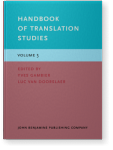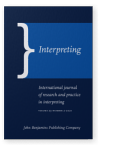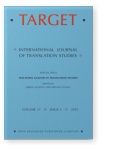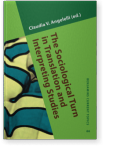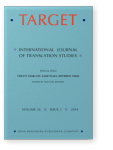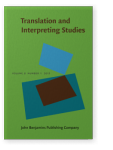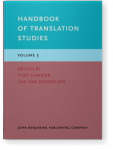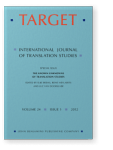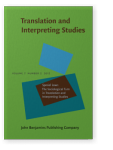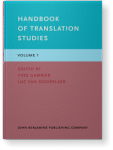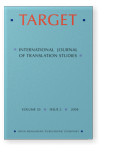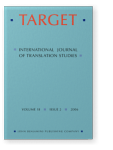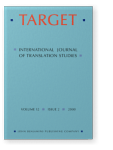Michaela Wolf
List of John Benjamins publications for which Michaela Wolf plays a role.
Online Resource
E-ISSN 2210-6022
Book series
Titles
The Habsburg Monarchy's Many-Languaged Soul: Translating and interpreting, 1848–1918
Michaela Wolf
[Benjamins Translation Library, 116] 2015. xvii, 289 pp.
Subjects History of linguistics | Translation Studies
Constructing a Sociology of Translation
Edited by Michaela Wolf and Alexandra Fukari
[Benjamins Translation Library, 74] 2007. vi, 226 pp.
Subjects Translation Studies
2023 Chapter 10. The interpreter as “anti-hero”: Interpreters’ memoirs and their contribution to constructing a history of interpreting Towards an Atlas of the History of Interpreting: Voices from around the world, Ruiz Rosendo, Lucía and Jesús Baigorri-Jalón (eds.), pp. 238–267 | Chapter
Research on interpreters as authors of autobiographies has typically focused on the interpreting activity in authoritarian regimes, in trials, or diplomacy. A great number of the author-interpreters portray a hero figure positioned in often close relationship with the person in power. This… read more
2017 Baker, Mona, ed. 2016. Translating Dissent. Voices from and with the Egyptian Revolution Target 29:3, pp. 508–513 | Review
2015 Gouanvic, Jean-Marc. 2014. Sociologie de l’adaptation et de la traduction. Le roman d’aventures anglo-américain dans l’espace littéraire français pour les jeunes (1826–1960) Discourse Analysis in Translation Studies, Munday, Jeremy and Meifang Zhang (eds.), pp. 508–512 | Review
2014 The sociology of translation and its “activist turn” The Sociological Turn in Translation and Interpreting Studies, Angelelli, Claudia V. (ed.), pp. 7–21 | Article
The last few years have seen a great increase in works on what has been labeled a “sociological turn” in translation studies. This turn has particularly taught us to sharpen our “sociological eye” on the various agencies and agents involved in any translation procedure, and more specifically in the… read more
2014 “The language of Europe is translation”: EST amidst new Europes and changing ideas on translation Twenty Years EST: Same place, different times, Boyden, Michael (ed.), pp. 224–238 | Article
Umberto Eco’s statement “the language of Europe is translation” suggests that translation is one of the main assets of daily communication in Europe. While such a statement undoubtedly is a stand against national—or, in many instances, nationalistic—language cultures, it also raises a series of… read more
2013 “German speakers, step forward!”: Surviving through interpreting in Nazi concentration camps Translation and Interpreting Studies 8:1, pp. 1–22 | Article
In Nazi concentration camps the prisoners were frequently of 30 to 40 different nationalities, and German and Polish Jews were in the majority. With German as the only official language in the lager, communication was vital for the prisoners’ survival. In the last few decades, there has been… read more
2012 Common grounds in Translation and Interpreting (Studies) Handbook of Translation Studies: Volume 3, Gambier, Yves and Luc van Doorslaer (eds.), pp. 7–16 | Article
2012 Loogus, Terje. 2008. Kultur im Spannungsfeld translatorischer Entscheidungen.Probleme und Konflikte The Known Unknowns of Translation Studies, Brems, Elke, Reine Meylaerts and Luc van Doorslaer (eds.), pp. 178–181 | Review
2012 The sociology of translation and its “activist turn” The Sociological Turn in Translation and Interpreting Studies, Angelelli, Claudia V. (ed.), pp. 129–143 | Article
The last few years have seen a great increase in works on what has been labeled a “sociological turn” in translation studies. This turn has particularly taught us to sharpen our “sociological eye” on the various agencies and agents involved in any translation procedure, and more specifically in the… read more
2010 Sociology of translation Handbook of Translation Studies: Volume 1, Gambier, Yves and Luc van Doorslaer (eds.), pp. 337–343 | Article
2008 Hermans, Theo, ed. 2006. Translating Others Target 20:2, pp. 369–378 | Review
2007 The location of the 'translation field': Negotiating borderlines between Pierre Bourdieu and Homi Bhabha Constructing a Sociology of Translation, Wolf, Michaela and Alexandra Fukari (eds.), pp. 109–119 | Article
Pierre Bourdieu’s theory of symbolic goods has been widely applied to the reconstruction of various specific fields, such as the literary, the political or the media field. In the effort to re-enact the mediation processes between different fields – e.g. the translation procedure –, however, it… read more
2007 Introduction: The emergence of a sociology of translation Constructing a Sociology of Translation, Wolf, Michaela and Alexandra Fukari (eds.), pp. 1–36 | Miscellaneous
2006 Diocaretz, Myriam & Marta Segarra, eds. 2004. Joyful Babel: Translating Hélène Cixous Target 18:2, pp. 367–370 | Review
2006 The female state of the art: Women in the “translation field” Sociocultural Aspects of Translating and Interpreting, Pym, Anthony, Miriam Shlesinger † and Zuzana Jettmarová (eds.), pp. 129–141 | Article
Feminist translation is playing an increasing role in German-language countries. A large empirical research project on this development indicates changes in the social contexts of translation. The contexts are analyzed by focusing on the (mostly female) social agents involved and the relations… read more
2000 Bassnett, Susan & Harish Trivedi, eds. 1999. Post-colonial Translation: Theory and Practice Target 12:2, pp. 385–390 | Review
1997 Translation as a process of power: Aspects of cultural anthropology in translation Translation as Intercultural Communication: Selected papers from the EST Congress, Prague 1995, Snell-Hornby, Mary, Zuzana Jettmarová and Klaus Kaindl (eds.), pp. 123–134 | Article
